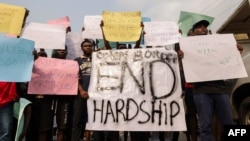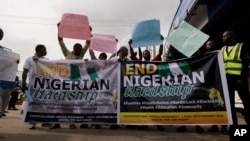Nigeria is suffering an economic crisis and soaring prices have left many people struggling to afford food.
Demonstrators in the southwestern city Ibadan were furious with President Bola Ahmed Tinubu's leadership, according to an AFP journalist at the scene.
Watched over by armed police and soldiers, the protesters closed a road and chanted. They carried signs that said "End bad government", "End food scarcity" and "End Nigerian hardship."
"This hunger is too much," said 26-year-old student Olaide Alamu, adding, "it's not been like this before... we are starving.”
The 26-year-old student called on Tinubu to “do something.”
"He (Tinubu) promised to do better. Look at us now," Alamu said.
After coming to office last year Tinubu ended a fuel subsidy and currency controls, leading to a tripling of petrol prices and a spike in living costs as the naira has slid against the dollar.
The 71-year-old leader has repeatedly called for patience to allow his reforms to take effect, saying they will help attract foreign investment, but the measures have hit Nigerians hard.
Nigeria’s inflation rate reached almost 30 percent in January, according to the national bureau of statistics.
Many poor Nigerians have had to give up products considered a luxury, such as meat, eggs and milk.
Dire conditions in the north have sparked protests in several cities including Suleja near the capital Abuja, Minna in Niger State, and the economic hub of Kano.
The crisis has forced people in the north to skip meals and eat poor-grade rice used as fish food.
To feed their children, women have even resorted to digging up anthills in search of grain stored by the insects, according to videos on social media.
Earlier this month the influential traditional emir of Kano Aminu Ado Bayero warned that Nigerians faced "economic hardships, hunger and starvation" and called on the president to take urgent action.
Titilayo Olusegun, a 38-year-old business owner at the demonstration in Ibadan said that "if (the president) cannot solve our issues, he should vacate the office."
"There is too much hunger. We can't pay our children's school fees, we can't pay our rent... it's difficult to eat," Olusegun said, adding, "the pain is too much."


Forum